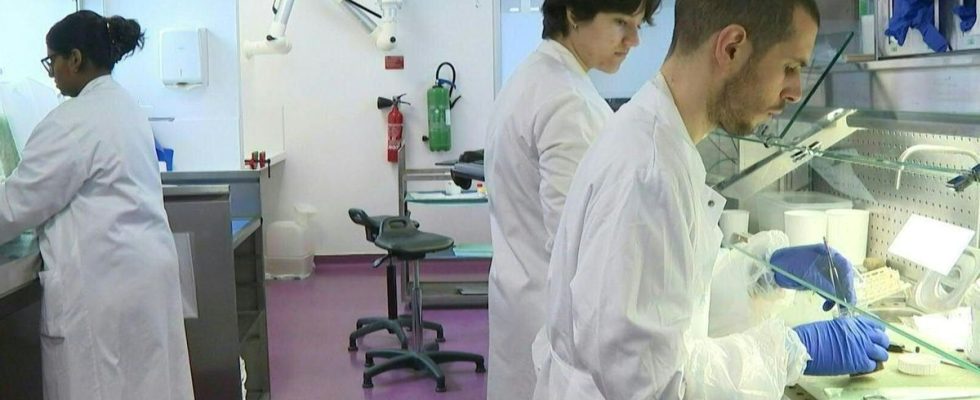Published on
Updated
Reading 3 min.
In her “augmented pathologist’s cockpit”, doctor Catherine Guettier no longer analyzes her biopsy slides under a microscope, but on a screen. And artificial intelligence (AI) then intervenes to help with the diagnosis or predict the progression of certain cancers.
The move in 2019 to reading slides on screen “changed our practices” towards “high-precision pathology”, explains the head of the pathological anatomy and cytology department at the Kremlin-Bicêtre hospital, a town adjoining Paris , south of the French capital.
The glass slides of tissue samples are digitized using very powerful scanners, they can be analyzed on screen and subjected to AI algorithms. “While there is a shortage of pathologists in France, AI will save us time for repetitive tasks,” according to the practitioner.
But “we are only at the beginning of the story“, underlines the expert, zooming in on the image of tissues taken during a mastectomy, to collect the characteristics of the tumor lesions.
A single computer click is enough to see displayed in a few minutes, in the form of a document, the prognosis of a risk of relapse for the patient suffering from early stage breast cancer.
This time, the prognosis is encouraging. But it will not be taken into account in the doctor’s diagnosis: the artificial intelligence solution by “learning”, although integrated into the working environment of pathologists since the end of February, must still obtain its CE marking to be authorized for medical routine. This certification is expected around mid-2025.
“Game Master”
“A pathologist may have a slightly tired eye in the evening, but an algorithm is never tired!“, says Professor Guettier.
The tool “exceeds the capabilities of the pathologist’s eye“, hence the notion of “augmented pathologist”, she observes. But the specialist “remains master of the game” by controlling the consistency of the algorithm’s result.
Developed by the Franco-American unicorn Owkin, this AI tool aims to “prevent relapse at 5 or 10 years from a single slide“after removal of the tumor, and thus know”which woman can avoid expensive chemotherapy“, explains Victor Aubert, product manager at Owkin, to AFP.
Biotech trained on “a database of 1,500 slides from patients at the Gustave Roussy cancer center“, the first European center to fight cancer, in the southern suburbs of Paris. And it continues to refine the tool by relying on the expertise of pathologists at Bicêtre hospital, adds Mr. Aubert.
In prostate cancer too, AI algorithms come “pre-process the work” of pathologists and make them “gain in quality, speed and precision“, tells AFP Dr Adam Clovis, in Bicêtre.
Thanks to access to the cloud pathology platform assisted by artificial intelligence from the Finnish company Aiforia, the doctor can detect the centers of this cancer in a few minutes, measure their surface area and give their level of severity.
Therapeutic de-escalation
“Before, we made points with a marker on the slide to measure the cancerous site with a ruler!” under the microscope, recalls the specialist.
In prostate biopsies, it is necessary to analyze on average “26 slides per patient”, a task which lasts “between 20 and 25 minutes” for the 26 slides, a time reduced by some 30% thanks to the algorithms, according to the pathologist.
From now on, “the biopsies are scanned and analyzed at night by the algorithm on a server in France“, he emphasizes. “In the morning, when you arrive, all the information is available, just export the data in the form of a table“.
For the moment, the practitioner checks that he is able to retrospectively reproduce a diagnosis provided by the algorithm, until the tool is truly integrated into his daily activity.
He hopes for “an improvement in patient care”, because “Not all prostate cancers need to be treated“: thanks to the precision of the diagnosis, the patients treated”will be those with aggressive cancers“.
Breast or prostate cancers, the goal is to avoid unnecessary treatments and to have what practitioners describe as “therapeutic de-escalation”.
